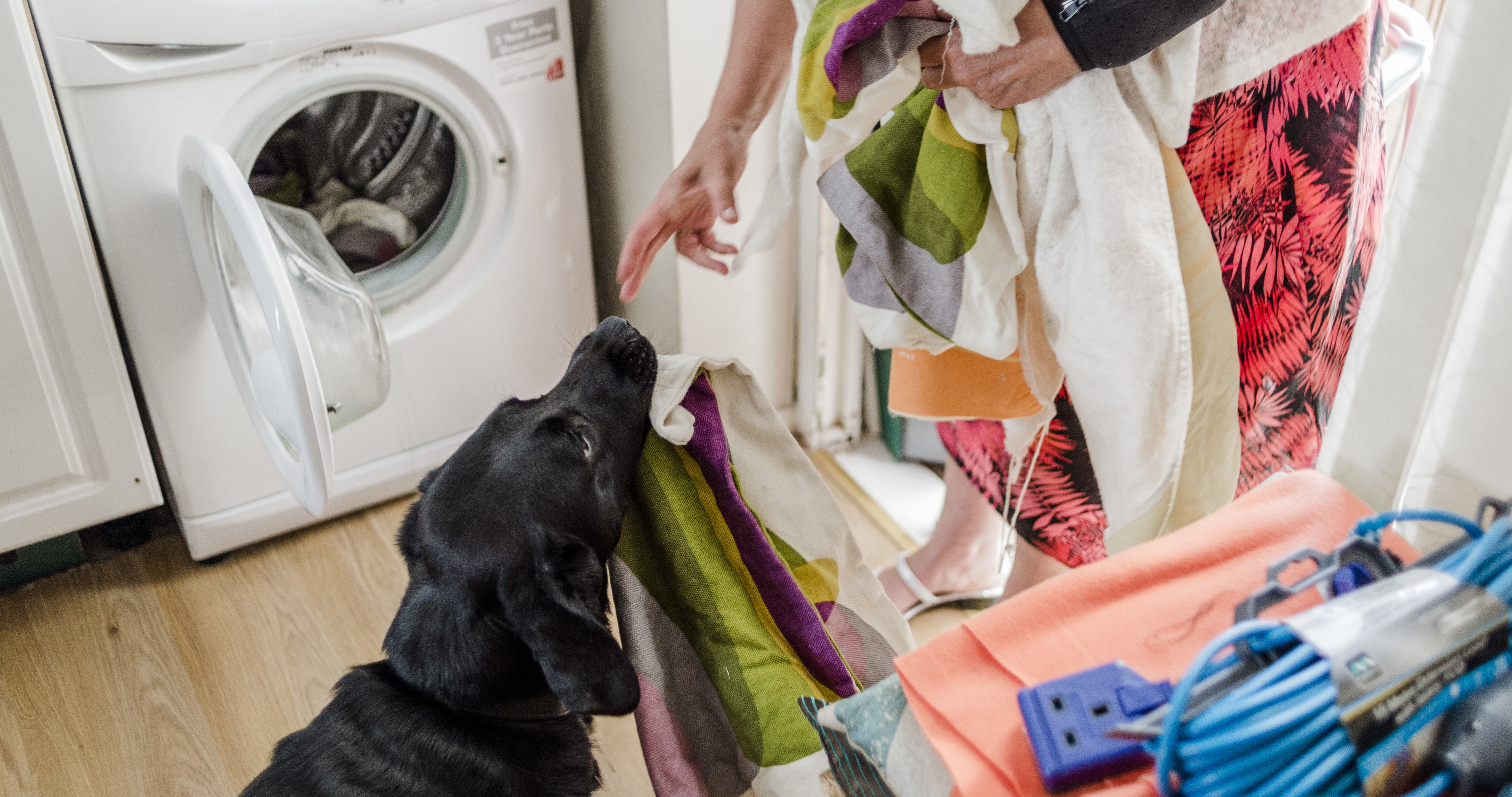Opening doors

Given up as a boisterous puppy, Riley’s future looked bleak. Several months on, he’s proving doubters wrong and changing lives…
When the smart and obedient dog dressed in an official yellow jacket accompanies his owner to their local supermarket, no one suspects that the expertly trained black Labrador was once given up for being too bouncy.
Riley is living proof that with the right training and encouragement, rehomed dogs can achieve great things.
Riley arrived at Blue Cross as a nine-month-old pup who had boundless energy and was sadly too much of a handful for his owners to cope with.
After staying with us for a few weeks - and living up to his bouncy reputation - we had a call from a member of the team at Dogs for the Disabled, who had seen his profile on our website and was interested in giving him a working home.
Dogs for the Disabled is a charity that trains and places assistance dogs with children and adults with physical disabilities, as well as with autistic children, throughout England and Wales.
Jess Hollis, an Animal Welfare Assistant at our Lewknor rehoming centre, where we cared for Riley, says: “They told us they were looking for a dog motivated by food with potential to learn - Riley in a nutshell!
“Riley had definitely proven his intelligence and enjoyment for his training, as he had already learnt many commands.”
A new career
After meeting him, the Dogs for the Disabled team agreed he was just what they were looking for and Riley left Blue Cross and headed off on the path to becoming an assistance dog.
Chris Allen, Dogs for the Disabled’s Dog Supply Manager, says that Riley’s rehoming centre background was no reason to prevent his future career. He had just the right characteristics to become an assistance dog, proving that the stereotype that dogs in rescue are inherently faulty is simply untrue.
Chris explains: “We look for a nice, willing-to-please character who is outgoing, enjoys life, wants to go and investigate, and is curious about the world, and Riley had all this.
“We knew that he had some learning to do, but he wanted to work, he wanted to please, and he loved being with people.”
Riley followed a very similar training process to assistance dogs that are born into the role.
He was matched to a volunteer puppy socialiser and reintroduced to a home life for several months, before heading to Dogs for the Disabled’s training centre in Banbury, Oxfordshire, to learn all the skills he would need to help a disabled person in the home.
At the end of this intensive learning process, Riley was matched up to Ella Wilson, and the pairing was a hit from the word go.
He is now fully qualified and working.
Changing lives
Ella, who has a condition which led to osteoarthritis, says Riley has changed her life completely.
Osteoarthritis makes it painful and impossible for Ella to perform the everyday tasks that most of us take for granted, such as unloading the washing machine.
She applied for an assistance dog after her partner died, knowing that having a skilled dog to help her with daily life would allow her devoted son Tom, who had cared for his mum since he was 15 years old, and throughout his time at university, to live his own.
"The biggest thing that Riley helps me with physically is picking things up from the floor,” Ella explains.
“Because of the condition I’ve got, that can wipe me out, so he goes along, picks things up and brings them to me.
“He’ll fetch the post, he’ll pull things out of the washing machine when I can’t reach them, and he can open doors. When we’re out of the house he presses the big disabled access buttons to open doors, and if I drop my purse, he fetches it for me.”
While Riley is a huge help with performing physical tasks, it’s the independence and social interaction he brings that has freed Ella from the isolation that so often comes hand in hand with illness.
Ella says: “I talk to hundreds of people now, which I never did before because people don’t know what to do with a lady in a wheelchair, but they know how to talk to a lady with a dog. It’s marvellous.
“I wasn’t allowed out in my wheelchair on my own around the village, but with Riley, I can go round the corner to post a letter when I want to do it, without having to ask anyone to help. We visit the café and the library, and Riley has learned to ring the doorbell when we go to the chemist. When they open the door, he goes in to fetch my prescription.
“I’ve been so isolated here, but now I can see friends that I haven’t seen for ages.
“He’s made a total difference to my life.”


